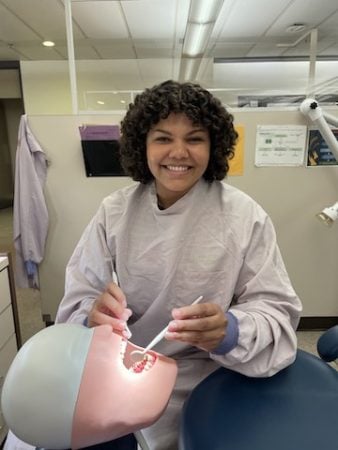
Pre-Dental student Riley Stichter is majoring in human biology with minors in pre-health and public health. Riley hopes to go to dental school and eventually use dentistry to improve public health. We talked to Riley to understand how undergraduate research prepares her for dental school and her dream of working in a dental clinic serving the underserved.
Q: Why did you choose to study human biology as a pre-dental student at Michigan Tech?
Riley: I chose to study human biology at Michigan Tech because I have always been interested in the human body. The courses required for the major drew my attention as they were difficult science courses that I believed would prepare me well for a future career in healthcare. I really appreciated the flexibility in this major to choose upper-level science courses from a wide variety of options. Finally, the requirement for a human interactions course really sold this major for me as I’ve always enjoyed learning about human behavior and social interactions.
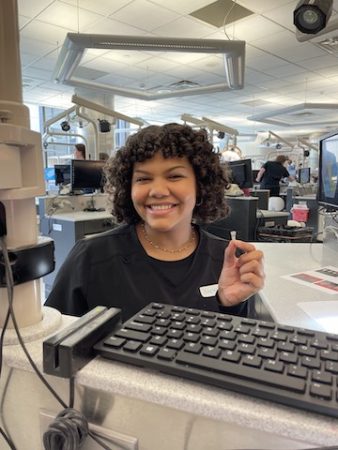
Q: You worked at a dental clinic after your first year at Tech. Tell us how that opportunity came about. What kinds of things did you do? How has that work influenced your career path?
Riley: I started with the Mission Outpost Dental Clinic during the summer after my freshman year at Tech. I reached out to the clinic manager through email after searching for nonprofit dental clinics online. I’ve had an amazing experience as a volunteer at Mission Outpost. The clinic provides great opportunities for students to get hands-on learning.
I was taught how to do sterilization of dental equipment, turn over rooms after appointments, and set up for the next appointment. I also helped with patient intake where I take the patient’s blood pressure and temperature and obtain their medical history. I’ve even been able to assist the dentist with water and suction during a few procedures. These experiences have shown me what a career as a dentist would look like. They helped confirm that dentistry is the right path for me. Finally, I’ve really enjoyed the patient interactions at the clinic. It’s great to be able to serve the community that I grew up in and the people who need care the most. This has inspired me to pursue a career as a public health dentist and further research oral health disparities.
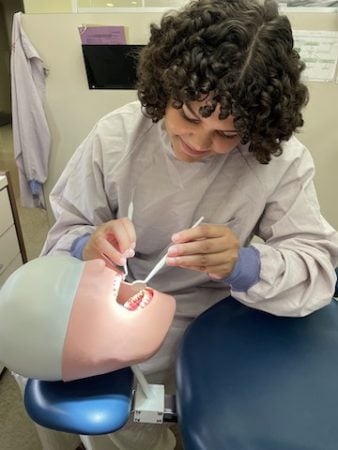
Q: How has the dental clinic prepared you for your pathway as a pre-dental student?
Riley: It has given me great clinical dentistry exposure and experience because of the things I have been asked to do. I’m using common terms and equipment. I’ve been learning about materials and instruments. And I’ve been experiencing patient-doctor interactions firsthand.
I am seeing some of the problems in our medical care system and how it impacts families. For instance, families are not seeking basic dental care because they lack insurance. the result is they often have worse problems with their teeth than they otherwise would have had if they had been seeing a dentist for basic care.
In general, it’s been a great step on this pre-dental journey to dental school.
Q: You chose to do undergraduate research. Tell me how you became interested in doing research.
Riley: I did not enter college with the desire to get involved with research. However, through several small research assignments required in different courses during my freshman year, I realized the opportunity for personal growth and deeper learning that research provides. After making a short presentation on different ACL graft types in my Biology 2 class, I decided to look online and see if any professors at Michigan Tech conducted similar research. My curiosity was driven by the extensive time that I spent considering different ACL graft types before I underwent ACL reconstruction surgery.
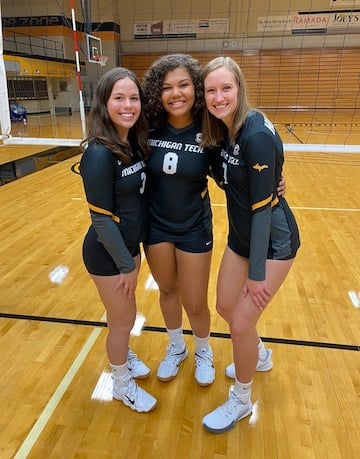
Q: How did you initiate research with your professor?
Riley: I used Michigan Tech’s website to look at the research projects different professors were conducting. After I found a professor (Erich Petushek) doing research that aligned with my interests, I sent him an email asking if he had any available positions in his lab. I attached my relevant coursework as well as my resume in this email, and we were able to set up a Zoom meeting to further discuss his current research projects and my interests.
Q: What kinds of things do you for undergraduate research?
Riley: I am currently assisting Dr. Petushek with his research on psychosocial factors affecting ACLR (ACL reconstruction) patient recovery and their ability to return to sports. The work I have done so far has involved finding relevant articles for different psychosocial factors, reviewing relevant articles and preparing brief summaries, and helping complete the review protocol and registration for an upcoming literature review with meta-analysis.
The review protocol involves outlining our specific review question and eligibility criteria of which studies can be included based on different factors. It also involves writing a brief background and providing relevant literature on the topic. This protocol will then be registered (although this has not happened yet) into a database of systematic reviews which allows it to be checked for redundancy against other current reviews.
Q: What will you learn next?
Riley: More recently, we have begun the process of beginning this literature review which will be my project for the URIP (Undergraduate Research Internship Program) this upcoming semester. For this project, I will learn to use Covidence and sort through hundreds of articles to find ones which meet our criteria and can be included in our study, learn how to do a meta analysis using R software, and help write the review. The overarching goal of this research is to identify which psychosocial factors best predict relevant outcomes for patient recovery in order to identify which patient reported outcome measures (PROMs) are most useful to predict poor outcomes.
Q: What do you enjoy most about the research you do?
Riley: The thing I enjoy most about the research I do is learning new skills and developing them. Analyzing research articles has given me a deeper understanding of the ACLR recovery process. I’ve learned new software such as Endnote and Zotero to organize my findings. Additionally, I’ve develop a deeper understanding of psychology and what makes data statistically significant. I am also looking forward to learning more about the process of writing and publishing a literature review, as well as using the Covidence and R software.
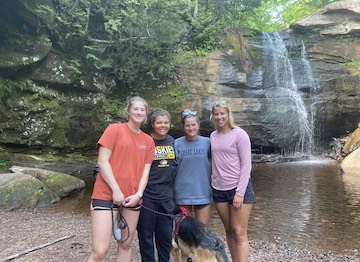
Another thing that I enjoy about this research is that it correlates with my life experiences as I went through ACLR recovery myself. This puts me in a position where I can provide a unique perspective on what patients feel during the recovery process and which factors are relevant to patients. I felt that my own recovery process was not optimal. So I am enjoying learning about which factors can impact recovery and help improve future athletes’ recoveries and ability to return to sport.
Q: Has your research experience influenced your pathway as a pre-dental student?
Riley: Absolutely. So far, I’ve learned I enjoy the process and all the learning. I definitely want to do research in dental school.
Q: What advice do you have for students interested in pursuing research?
Riley: It’s a lot easier to get involved in research than you think. If you have an interest or passion, research is a great way to get involved ansd learn more about the subject.
Q: You have been able to teach and mentor your peers at the Bio Sci Learning Center, too. What has that been like? What do you enjoy most about volunteering there?
Riley: I started in the Biological Sciences Learning Center (BLC) after my first year at Tech. I work as a coach where I am able to tutor other students with upper-level biology courses that can be difficult to understand. My job also includes leading review sessions before exams for courses in the biology department. I love getting the chance to meet new people, as well as help others understand complex concepts. The BLC is also a very cozy environment which makes it a great place to study. I find myself studying there even when I’m not working.
Overall, my favorite part about being a BLC coach is the ability to meet my peers outside of class and develop relationships as they attend review sessions or come in to get help with assignments. I am able to meet them where they are in their journeys. And I can provide a comfortable environment in which to help them.
About the Michigan Tech Pre-Health Program
The Michigan Tech pre-health program is an excellent entree to a rewarding career in health. We prepare you for graduate health programs like medical school, dental school, pharmacy school, and other allied healthcare professional programs. You receive help navigating the application process and obtaining experiential learning opportunities, like clinical experience. You obtain the prerequisite courses you need to apply. The result — a 70% acceptance rate into all graduate health programs for Tech graduates (nearly twice the national average). Learn more about the student experience on the Pre-Health Blog.